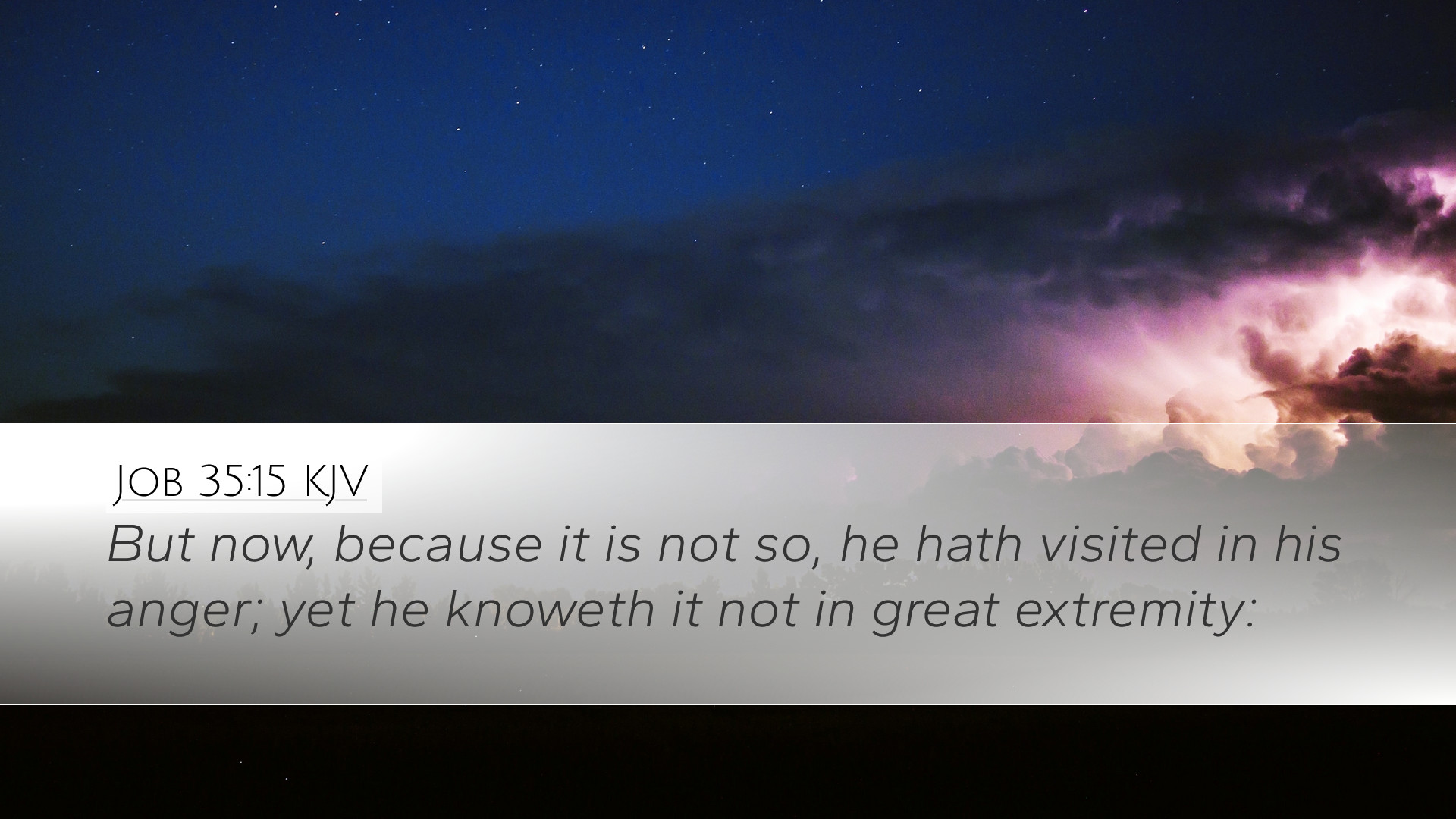Old Testament
Genesis Exodus Leviticus Numbers Deuteronomy Joshua Judges Ruth 1 Samuel 2 Samuel 1 Kings 2 Kings 1 Chronicles 2 Chronicles Ezra Nehemiah Esther Job Psalms Proverbs Ecclesiastes Song of Solomon Isaiah Jeremiah Lamentations Ezekiel Daniel Hosea Joel Amos Obadiah Jonah Micah Nahum Habakkuk Zephaniah Haggai Zechariah MalachiJob 35:15
Job 35:15 KJV
But now, because it is not so, he hath visited in his anger; yet he knoweth it not in great extremity:
Job 35:15 Bible Commentary
Commentary on Job 35:15
Introduction
Job 35:15 presents a profound insight into the nature of God's justice and man's relationship with the divine. This passage serves as a critical point of reflection in the broader discourse of the Book of Job, especially as it pertains to the themes of suffering, divine silence, and the seeming inequality in the circumstances of the righteous and the wicked. This commentary synthesizes insights from esteemed public domain commentaries such as those by Matthew Henry, Albert Barnes, and Adam Clarke to provide a meaningful exploration for pastors, students, theologians, and Bible scholars.
Text of Job 35:15
"But now, because it is not so, He has visited in His anger; yet He does not so impute it to the transgression." (Job 35:15)
Contextual Overview
Job 35:15 belongs to a discourse by Elihu, one of Job's companions, who presents a nuanced understanding of God's workings. Elihu emphasizes that God's relationship with humanity is not merely transactional or dependent on human righteousness. This perspective becomes particularly important given Job's insistence on his innocence amid suffering. Elihu suggests that God’s silence or inaction does not equate to apathy or injustice.
The Importance of Divine Justice
According to Albert Barnes, the essence of Elihu's argument is that God's justice operates beyond human understanding. While men may question God's fairness in their suffering, it is essential to recognize that God's actions are just, even in their obscurity. God's omniscience means that He observes human actions and does not necessarily reward or punish in ways that are apparent to human understanding.
The Nature of Divine Silence
Matthew Henry elaborates on the aspect of divine silence, positing that God may not always respond in ways expected by humans, especially during times of distress. He suggests that while God may seem distant, it is not a sign of neglect. Instead, God's inscrutable ways are a part of His divine wisdom. In Job 35:15, the reality of divine anger is acknowledged, yet the divine response does not always align with human notions of punishment. This indicates a depth of understanding that Elihu wants to impart to Job.
Theological Insights
1. God's Sovereignty
Adam Clarke emphasizes the importance of recognizing God's sovereignty over creation. Job 35:15 reinforces the notion that God retains authority over both righteous and wicked conduct. His governance is not to be challenged or questioned; rather, it invites reverence and faithfulness from His creation.
2. The Role of Human Responsibility
While God’s anger is acknowledged, there is an implication of human responsibility in the context of Job’s trials. Elihu suggests that transgression may not always elicit divine retribution, introducing complexity to the understanding of suffering and justice. This serves as a reminder of the profound tension between divine control and human agency.
3. The Impartiality of God
Henry further articulates the idea that God’s dealings with humanity are impartial. His anger does not lead to immediate condemnation but rather serves as an opportunity for introspection and repentance. Divine silence, in this view, acts as a platform for personal reflection rather than mere punitive action.
Practical Applications
The insights gleaned from Job 35:15 prompt several practical applications for believers seeking to understand their own experiences of suffering:
- Trust in Divine Wisdom: Believers are encouraged to trust in God’s greater wisdom when faced with trials. The lack of immediate response is not indicative of abandonment but a call to deepen faith.
- Reflecting on Righteousness: This verse prompts an examination of one’s own life. Introspection in light of God’s statutes can foster growth and understanding in the believer's walk.
- Understanding Suffering: The verse encourages believers to understand suffering in the broader context of God’s purpose. Suffering may have redemptive qualities that are not evident until later revelations.
- Encouraging Others: For pastors and leaders, this verse serves as a reminder to encourage others who feel abandoned by God during their struggles, affirming that silence is not a sign of God’s absence.
Conclusion
Job 35:15 serves as a vital reminder of God’s justice, sovereignty, and the complexities inherent in human suffering. Through the insights provided by Matthew Henry, Albert Barnes, and Adam Clarke, it becomes clear that God’s actions and inactions demand a response rooted in faith, humility, and acknowledgment of His divine authority. For pastors, theologians, and scholars alike, wrestling with these truths can lead to a richer understanding of God's nature and the human condition within the narrative of faith.


